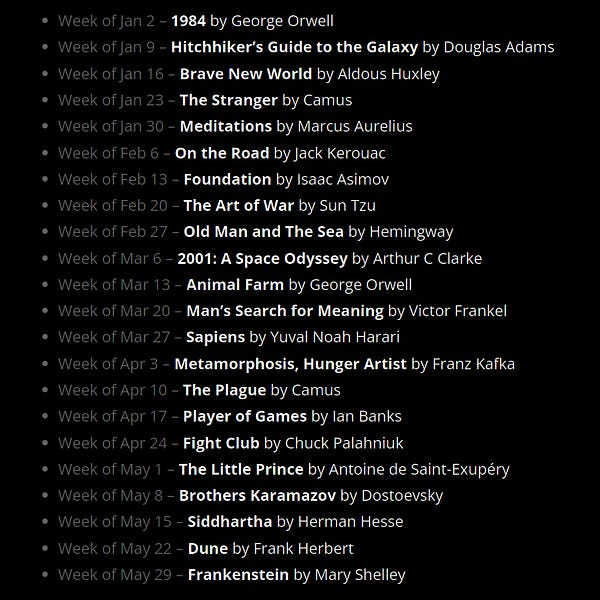
One of the frustrating things about getting old the fragmentation of social media is that individuals will percolate to the top of the Discourse and their names are unfamiliar to me. I had no idea who Andrew Tate was until recently, for example.
Then there is Lex Fridman. He’s a researcher on artificial intelligence who works at MIT. I have been assured by those in the know that he’s a legitimate researcher and his Google Scholar profile confirms it. Fridman also has a podcast with origins in discussions about artificial intelligence but has expanded to include “conversations about the nature of intelligence, consciousness, love, and power.” His guests include an eclectic group of notables and quotables. It must be somewhat popular; Fridman has more than 2 million Twitter followers.
I had never heard of him until his reading list post started making the rounds:


This list prompted some strong reactions. Black Swan author Nassim Taleb acted like he normally acts on Twitter, going on all his social media feeds to quote-tweet Fridman and explain: “if you don't get why, between 2019 and 2022, I turned down exactly 10 requests to be on his podcast, this will provide a succinct explanation.” Taleb elaborated in a tweet thread that contained what seems like his standard ratio of condescension and contrarianism:
If you want more cues, Mr. Lex Fridman does not seem to be part of the faculty at MIT. “Research Scientist” could be an unpaid external status that allows library access.
Note: not saying that one must be affiliated to an institution to produce knowledge. But using the name of an institution to build an image is something very shoddy. And sending mail with heading “Quick Note From MIT” when [his] podcast has nothing to do with MIT is shoddy as hell.
You tech [people] are not getting it. Anyone who pretends programmatically reading, discussing and digesting these books one/week is a total fraud. You fall for the shallow, vapid, overactive poseur inflating his "scientific" image. Idiots, you deserve Lex Fridman.
As that last paragraph suggests, Taleb was encountering some pushback on social media after his tweet rant. Some of that pushback, however, was from the likes of Jordan Peterson. Elon Musk also tweeted out his support of Fridman’s list. This suggests an urgent need to referee this Ideas Industry dispute before it blows up even further!
It’s worth noting that Taleb was hardly the only person to dunk on Fridman’s list. Many found it — what’s that word young people use so often nowadays — basic. It’s certainly true that many aspiring intellectuals read a lot of those books in high school. Political scientist Jeffrey Sachs was equally sour, stating “this list is trash. Adults should strive for more.“ He elaborated, “It’s bad as a list, as a kind of aspirational reading schedule for the year. I get that I sound snobby, but it’s frustrating to see someone with pretensions to intellectual leadership set this as a goal.” Sachs subsequently recanted, however, tweeting that “this was a really obnoxious comment and I want to apologize for making it.”
At the same time, some seemed to protest the Stakhanovite scheduling. It’s true that some of the books on the list, like Brothers Karamazov, are not “read in a week” kind of efforts. Others (including Taleb) seemed to mock Fridman’s reliance on others to guide his future reading choices.
To be blunt, however, most of these objections sound awfully snooty. At best, they highlight the holes in Fridman’s education to date. Given his background as an engineer, it would hardly be surprising if these books were not already on his shelves. It seems churlish to mock Fridman for wanting to fill in some of his literary gaps.
Perusing his list, what strikes me how many of the books can easily be read in a week or less. Most of the sci-fi choices are quick reads; most of the classics are under 150 pages in a cheap paperback. Some of those books are not great — I regret to inform you that Foundation is terrible — but are cited so frequently that reading them once seems necessary. Most of Fridman’s choices have sufficient literary staying power to recommend a perusal.
Are these the choices that I would make if I was starting a reading list? No, but my background differs from Fridman. Even the most erudite academic has gaps in their reading that need to be filled.
So, my conclusions are:
Fridman’s list is fine;
Jordan Peterson and Nassim Taleb should rage at each other until the end of time.


Tbh the list is fine, I read most of these books. It they were forced upon me as a teenage in my college. Rereading would probably give me a complete different meaning and perspective than at the time of me being a teenager.
This is a good defense of Twitter's most recent List de Jour (displacing the Sight and Sound Greatest Films of All Time list, I think). I'm a bit more familiar with Lex and, well, the list is in character — he's kind of a basic guy, but that's why all of his (way too long for me) podcasts are interviewing other people. But he's nice and sincere and it really is a good idea to reread all those books you were forced to in high school since they are much more likely to be enjoyable now that you aren't a 17 year old who has to write a book report at the end of it.